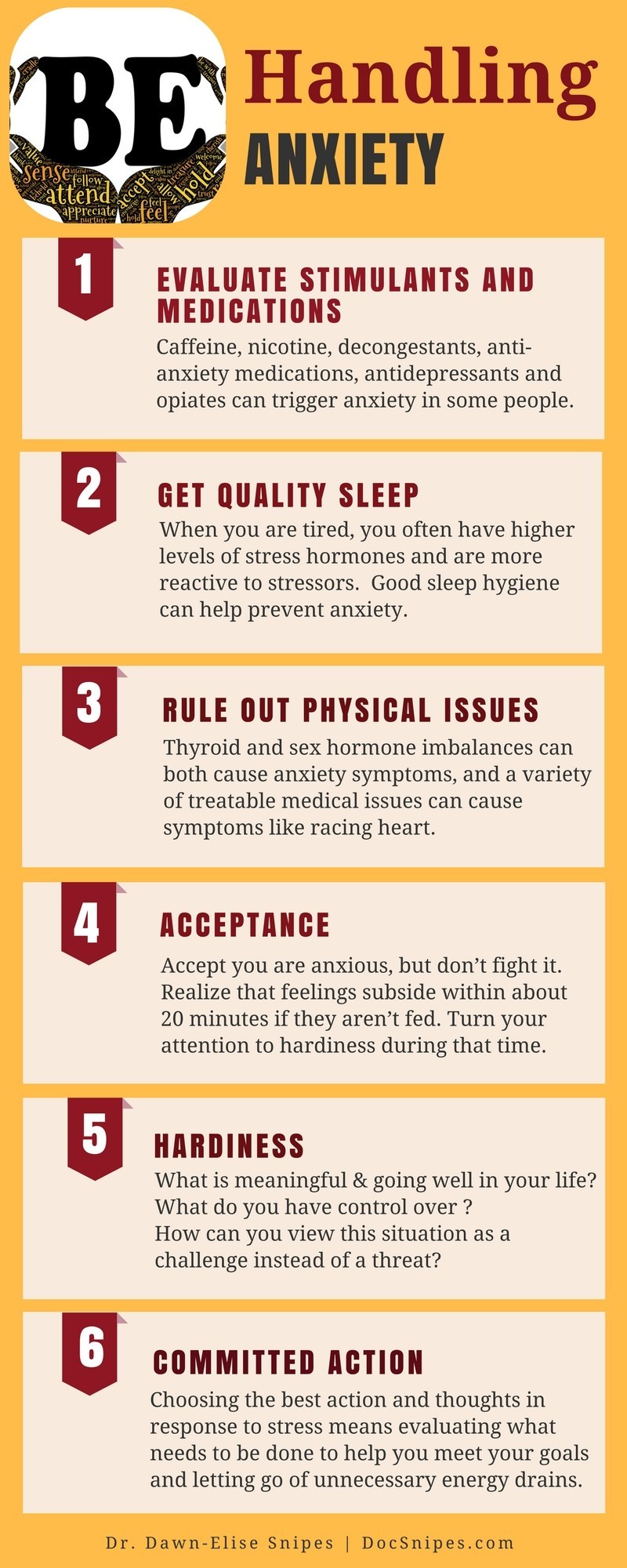
Dr. Dawn-Elise Snipes PhD, LPC-MHSP, LMHC
Executive Director: AllCEUs.com
Podcast Host: Counselor Toolbox and Happiness Isn’t Brain Surgery
Become a member at DocSnipes.com to be able to chat with Doc Snipes via text or video chat.
Introduction
Worry is a term assigned to energy tied up in the future about things which have not yet happened. Regret is a term assigned to energy tied up in anger or disappointment at yourself for things that already happened
Questions for you to think about:
- Is holding on to regret or worrying helping you achieve your goals and live a rich and meaningful life?
- How could you more effectively use your energy to achieve your goals?
Physical Interventions
The mind and body are intertwined. Anything that stimulates your nervous system can trigger or worsen anxiety. Remember that even small stressors can be additive, hence the term “The straw that broke the camels back.”
- Examine what stimulants you are consuming including caffeine and nicotine.
- Look at side effects of medications you are taking such as opiates, anti-anxiety medications, SSRIs, SNRIs, and decongestants. Some of these will rev you up when you take them, others may cause rebound anxiety.
- Learn about good nutrition and what nutrients the body needs to effectively produce serotonin and GABA.
- Practice good sleep hygiene to ensure your circadian (and cortisol) rhythms are in sync. Poor quality sleep is a stressor and will make it more difficult to concentrate and deal with life on life's terms.
- Get a physical to rule out hormone issues such as hyper thyroid or estrogen or testosterone imbalances. (Remember that, although hormone imbalances can cause anxiety symptoms, it is important to examine what is causing the hormone imbalances.
Environmental Interventions
- Your environment can be calming or draining.
- Too much brightness (including fluorescent lights), harsh lines and orange/red colors can contribute to anxiety. Create a calming space at home and work.
- Make sure you can always see people approaching you by adding mirrors and arranging furniture so you can see doorways and windows
- Essential oils (lavender, chamomile, valerian, clary sage) can help ease anxiety. Use a diffuser or wax melts to scent a room.
- Examine the environment for stressful items and sounds (pictures, bills, reminders of stressful people or times) and remove as many as possible, especially from your bedroom and other “relaxation areas.”
Cognitive Interventions
Thoughts trigger nervous system response. If you tell your body there is a threat, it will respond.
- Use these challenging questions to address one issue at a time.
- What is the evidence for and against this fear?
- Is my reasoning based on fact or feelings?
- What other explanations might there be for this?
- Am I using extreme (all-or-nothing) words?
- Which parts of this are within my control?
- How can I use this “nervous energy” to address things within my control?
- In the big scheme of things, is this worth my energy?
- Radical Acceptance and Hardiness
- Accept without judgement that you are anxious, but don’t fight it. Realize that feelings subside within about 20 minutes if they aren’t fed.
- Turn your attention to hardiness during that 20 minutes
- What in your life are you committed to / what is meaningful and going well
- What parts of your life and this situation do you have control over and what can you do to improve the next moment?
- How can you view this situation as a challenge instead of a threat?
Regret Interventions
Regret is anger at yourself tied up in the past. Remember, anger is a response to a threat.
- To eliminate regret, you must eliminate the threat.
- Identify the threat
- What does this regret say about you as a person?
- Is this true about you in all situations?
- Are you the same person you were then?
- How can you improve?
- How is this regret threatening to your self-image and/or current lifestyle? (cheating, criminal charges, DUI, abortion, drop out of college)
- How can you best deal with it now?
- In what ways can dealing with this issue make you stronger or help others?
- Focus on gratitude
- What is it that you have now that is good, despite the past?
- What opportunities do you still have
- Forgive yourself and accept that you are fallible. Forgiveness is a choice to quit “spending” energy in the past and dedicate that energy to improving in the future.
- Identify 5 people whom you respect. Are they infallible? Are they without regret? How would they handle regret?
- Explore the benefits (and perpetrators) of self-hatred
- What would happen if you stopped being angry at yourself for this?
- Who are the internal critics and what are they telling you?
Happiness Scavenger Hunt will help you remember there is more to life than eliminating anxiety/anger/regret. You cannot be miserable and happy at the same time
- Brainstorm a list of things that make you happy and do one each day, mindfully.
Summary
- Anxiety and regret take up an inordinate amount of people’s energy.
- Often understanding the function of the feeling and addressing it can help you get “un-stuck”
- Anxiety can be addressed both directly with cognitive interventions and indirectly by eliminating triggers and vulnerabilities
